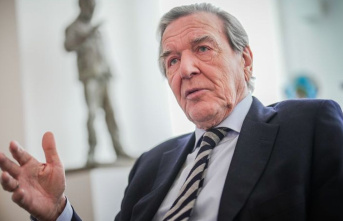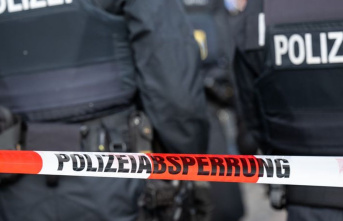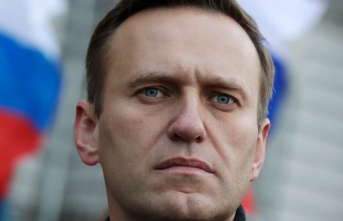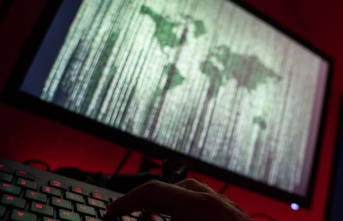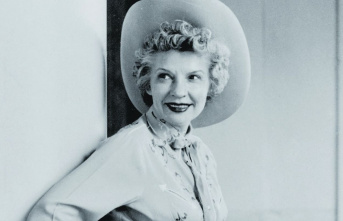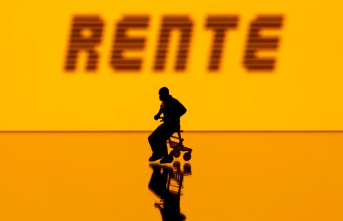The delivery of 14 Leopard 2 tanks had not yet been officially confirmed when former Ukrainian ambassador Andriy Melnyk spoke up. With his own self-confidence, the current Deputy Foreign Minister said in an ntv interview on Wednesday that this could only be "the first step". "One should actually think about it like in World War II. At that time, the Americans sent over 8,000 tanks and 14,000 fighter jets to the Soviet Union so that the Entente could win the war against Nazi Germany."
Ukraine now also needs a reinforcement of its air force, it needs modern fighter jets, Tornados. "We need warships to protect the coast. We also need submarines." And all of this has to be done much faster and faster than before. With his statements, Melnyk seemed to confirm the worst fears of all gun skeptics: no matter how much Germany delivers, Ukraine will always want more.
The red line is now at fighter planes
After the weapon delivery is before the weapon delivery. Since the beginning of the war eleven months ago, Germany has been discussing how much support it wants to give Ukraine and where the border should be. As Chancellor Olaf Scholz (SPD) explained in the Bundestag on Wednesday, the red line now runs for combat aircraft. But considering how things have developed since the famous announcement by ex-Defense Minister Christine Lambrecht (SPD) to deliver 5000 helmets, the last word may not have been said yet.
It is striking that there is no such intensive arms debate as in Germany in other countries. Not in France, not in Great Britain, not in Poland, not in the Netherlands. Why is that? The German history! In the Cold War, the Federal Republic was a "front-line state", which means: If there had been a hot war, it would have hit Germany first. The fear of it was present in everyday life. For example, if some unfamiliar rumble was heard in the distance, some jester might exclaim, "The Russians are coming!" Things were different again in the GDR: Russia was the big brother there, who was feared but also respected. The fear of irritating the "Russian bear" too much is therefore deeper in Germany than in other countries.
Add to that the burden of World War II. "Operation Barbarossa" - Hitler's unimaginably cruel war of aggression against the Soviet Union. Estimated casualties: 10 million Red Army soldiers, 14 million Soviet civilians. And now, after decades of German politicians laying wreaths in Moscow, should German tanks roll east again?
However, this argument can also be turned around: "The lesson of history is not that no matter what the Kremlin does, German tanks should never be used against Russia, but that they should be used to protect the Ukrainians, suffered the most under Hitler and Stalin," says British historian and Charlemagne Prize winner Timothy Garton Ash. Practically all expressions of opinion by Western commentators are now similar. The Israeli historian Yuval Noah Harari ("A Brief History of Humanity") assured the "Spiegel": "I can say this to the Germans as a Jew and Israeli and as the grandchildren of Holocaust survivors: We know that you are not Nazis. You doesn't need to prove it anymore. Germany has to stand up and lead now, because Germany is the leader of Europe in this situation."
"Never again war" as the founding ideal of the Federal Republic of Germany
But Germany continues to find it difficult to play a leading role in the military field. The Federal Republic simply does not have it in its genes. "Never again war" was one of their founding ideals. In addition, there was always another point of reference, explains the military historian Sönke Neitzel of the German Press Agency: "Never alone again." Going it alone and going your own way may be even more terrifying for the Federal Republic than military adventures. This also applies to Olaf Scholz, who has repeatedly emphasized since the beginning of the war that Germany would only act together with its allies.
The involvement of a very specific ally was now of the utmost importance in the tank decision: only when the USA had also promised to supply battle tanks and Scholz could be sure that Germany would not expose himself alone did the declared cautious politician jump over his The shade. Neitzel suspects behind it "the old German primal fear that the Americans could leave the Europeans alone". Even during the Cold War, Chancellor Helmut Schmidt said in a confidential circle that in the event of a Russian attack one would have to capitulate because the USA would not risk their own cities burning up in nuclear war for Europe.
Expert: Own war aims not sufficiently clearly defined
What happens now? The most staunch supporters of arms sales are arguing that Germany should simply give Ukraine whatever it wants. The defense expert Markus Kaim from the Science and Politics Foundation thinks this attitude is too simple. "With this justification, one could also - and I am now deliberately exaggerating - deliver nuclear weapons," he says. "Honesty dictates that German and Ukrainian interests do not always coincide. It may be in Ukraine's interest to liberate Crimea as well - but perhaps not in Germany's interest, because we will still have to live with Russia in the future. "
For Kaim, the core of the problem lies in the fact that Germany has not yet defined its own war goals with sufficient clarity. The line of the federal government is that it supports Ukraine to the best of its ability and that the government of President Volodymyr Zelenskyj decides completely independently up to which point it wants to continue fighting Russia. In Kaim's opinion, however, the German government should also decide for itself how far it wants to go in the conflict: "Do we just want to prevent the Russian armed forces from advancing any further? Or do we want the Ukrainian army to prevent the Russian army from occupying them Recaptured areas in eastern Ukraine - and maybe Crimea as well? Then of course we would have to deliver many, many more weapons. As long as this is not clarified, the Chancellor will inevitably come across as being driven."
The crucial questions have not been answered
One could counter that in this war with its surprising turns no long-term planning is possible. Nobody knows what's going on in Vladimir Putin's head, but experts are also largely groping in the dark when it comes to the extent of Ukrainian losses, for example. Military historian Neitzel believes Ukraine's strength is overstated. "The idea that Ukraine will now launch a major offensive with 40 or 50 main battle tanks and reconquer all the lost territories is nonsense," he believes. "As a result of the Russian mobilization, the balance of power has changed considerably."
In his eyes, the real danger is not the outbreak of the Third World War, but a defeat for Ukraine. "None of us knows how the war will continue over the next few months, but it's quite possible that, looking back, we'll realize: Too little, too late."


